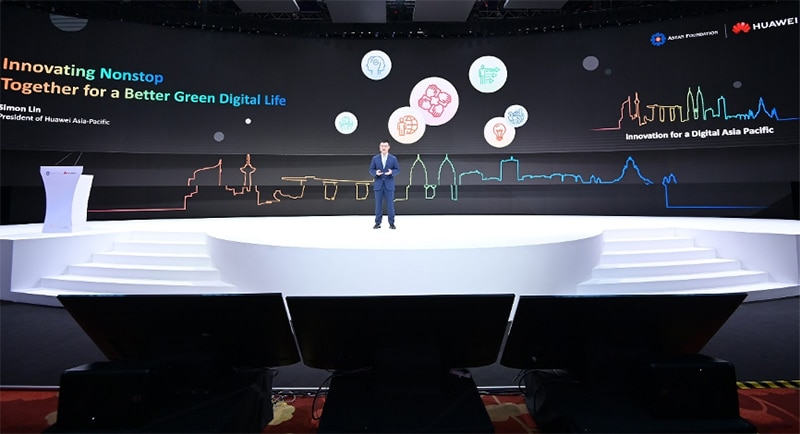Singapore—The Huawei APAC Digital Innovation Congress, jointly held by Huawei and the ASEAN Foundation, gathered over 1,500 government officials, experts, researchers, partners, and analysts from more than 10 countries in the Asia-Pacific region to explore the future of digital innovation and the digital economy.

Topics included ongoing advancements in ICT, speeding up digital transformation across industries, as well as green and low-carbon development.
“The Asia-Pacific region is one of the most culturally and economically vibrant regions in the world,” said Ken Hu, Huawei’s Rotating Chairman, during his opening speech. “It has long played an important role in global economic growth, and now plays an equally important role in digital innovation,” he continued, citing the fact that many APAC countries have elevated digital transformation to a strategic policy level and are actively going green.
“Huawei has deep roots in APAC. We have been serving our customers here for over 30 years, and we are proud to support digital development in the region. Moving forward, we will keep investing heavily in innovation to help our partners in the region meet their strategic development goals. In 2022, we will increase our support for a Green and Digital APAC by promoting digital infrastructure, low-carbon development, and digital inclusion.”
Yang Mee Eng, Executive Director of the ASEAN Foundation, also spoke at the event. “Only a strong digital talent team can achieve an inclusive and resilient digital Asia-Pacific region,” she said. “The Huawei APAC Digital Innovation Congress 2022 marks another critical milestone in the ASEAN Foundation-Huawei partnership to continue creating a talent development-focused learning ecosystem that will help address the digital skills shortage in the region.”
How Huawei is supporting the growth of Asia-Pacific’s digital economy
Simon Lin, President of Huawei’s Asia Pacific Region, spoke about the company’s mission, “In Asia-Pacific, for Asia-Pacific”, under which Huawei is committed to becoming a key contributor to the digital economy in Asia-Pacific, and working with its customers and partners to build a better green digital life.

Lin said, “Huawei hopes to help Asia-Pacific build a leading and green infrastructure, create a thriving industry ecosystem, and empower an inclusive and sustainable Asia-Pacific.” According to Lin, Huawei has provided connectivity for more than 90 million households and one billion mobile users in Asia-Pacific. Huawei’s IaaS market share ranks No. 4 in the emerging Asia-Pacific market, and Huawei is integrating digital and power electronics technologies to enable energy digitalization for a greener future.
In Asia-Pacific, Huawei has established partnerships with nearly 10,000 enterprise and cloud partners and plans to invest US$100 million in the Spark startup ecosystem and trained 170,000 locals on digital skills, and plans to provide digital training to another 500,000 within five years as part of its efforts to develop a talent ecosystem that can drive the digital economy forward.
As an ICT leader, Huawei is committed to promoting ICT industry development in the Philippines, and conducted several CSR programs, such as School in A Bag, Huawei Philippines Scholarship, etc. As the company’s flag CSR program, Seeds in the Future has been in the Philippines for 7 years, which benefited more than 200 students. Huawei Philippines also partners with more than 60 Philippine universities in ICT Academy, covered more than 13,000 students.
During the event, with participants including Prof. Paul Cheung, Director of the Asia Competitiveness Institute at the Lee Kuan Yew School of Public Policy of the National University of Singapore; Mohamed Djelid, Director of the UNESCO Regional Science Bureau for Asia and the Pacific; Dr. Iskandar Samad, President & Chief Executive Officer of MIMOS Berhad, Malaysia’s national applied research and development center; and David Lu, President of Huawei Asia Pacific Strategy & Marketing. The panelists concluded that a thriving and sustainable Digital Asia-Pacific depends on effective top-level strategic planning, favorable industrial policies, solid digital infrastructure, wide adoption of digital applications, and a strong digital talent ecosystem.
The event included four industry sessions focused on new innovations in digital infrastructure: intelligent campuses, full-stack data centers, digital power, and cloud. At the Intelligent Campus session, Huawei released solutions for multiple campus scenarios, including simplified campus networks and FTTO/FTTM scenarios, and shared the latest achievements and best practices of its customers and partners. At the Cloud session, Huawei unveiled new products and solutions like GaussDB—a new cloud storage database —and DevCloud—a one-stop DevOps shop for more efficient software development.





